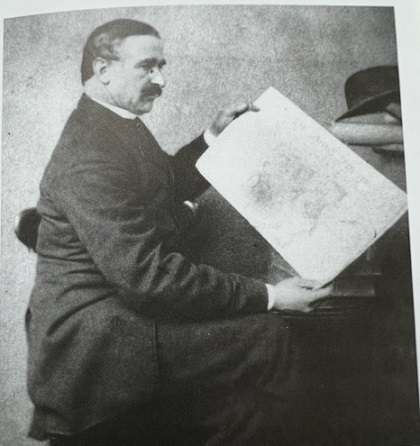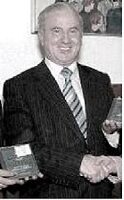
James Daly (1836–1911) has been described by historian Joseph Lee as ‘the most undeservedly forgotten man in Irish history’ in his book The Modernisation of Irish Society 1845-1918 (1979, pp.69/70). He had a big role in the land agitation that started in the west of Ireland in the late 1870s, which led to the formation of the Land League and eventually to tenant farmers becoming owner-occupiers of their holdings within a generation.
A native of Boghadoon in the parish of Addergoole in north Mayo, James Daly inherited a large holding of land on the Palmer estate from his father. He was educated locally and at the Franciscan Friary at Errew, near Castlebar. With Alfred O’Hea, he purchased the then Mayo Telegraph newspaper in February 1876, and changed its name to the Connaught Telegraph. Due to illness, O’Hea sold his share of the newspaper to Daly in January 1879. A strong nationalist, a town commissioner and Poor Law Guardian, James Daly served as secretary of the Mayo Tenants’ Defence Association from 1878, and became a tireless constitutional champion of agrarian reform. Under his editorship, the Connaught Telegraph became the most important newspaper in the country for articulating the grievances of tenant-farmers and social conditions in general in the west of Ireland. Despite his large farming interests, James Daly was a big supporter of those with small holdings.
Some tenants on an estate near Irishtown, County Mayo, who were under threat of eviction in January 1879, met James Daly, and asked him to publish their grievances in the Connaught Telegraph. He rejected their request, in fear of libel action, but advised them to hold a public meeting to ventilate tenant grievances in general, as well as demanding a reduction in their rents. A meeting was held in February 1879 in Claremorris attended by James Daly, Michael Davitt and others at which arrangements were made for a demonstration to be held at Irishtown on Sunday April 20, 1879. The Irishtown meeting, which was attended by a large crowd and chaired by James Daly, ignited the flame that was to change the face of rural Ireland. The eviction notices were withdrawn and the rent was reduced by twenty-five per cent. The next big meeting took place in Westport on June 8, 1978, again chaired by James Daly, at which both Charles Stewart Parnell and Michael Davitt spoke. All such land meetings were well publicised in the Connaught Telegraph. The National Land League of Mayo was established on August 16 ,1879, in James Daly’s Hotel in Castlebar. This evolved into the Irish National Land League, which was established in Dublin on October 21 1879, with Parnell as President and Michael Davitt, its organiser-in-chief, one of the secretaries. After becoming a member of its central committee, it is said that James Daly addressed over a hundred Land League meetings. He, Michael Davitt and James Killen were arrested for alleged seditious speeches on November 19, 1879, at Gurteen, County Sligo and sent to Sligo Jail, but the trial against them later collapsed. The Land War lasted from 1879 to 1882. After the introduction of the Coercion Act in 1881, James Daly was arrested and spent five weeks in Galway Jail.
The pioneering work of James Daly in ventilating the grievances of tenant-farmers in the Connaught Telegraph created hope that the system could be changed. His major roles as secretary of the Mayo Tenants’ Defence Association from 1878, in organising and chairing the important meetings in Irishtown and Westport, in his influential evidence to the Bessborough Commission in 1880, which led to major changes in the 1881 Land Act, as well as his involvement in the Land League campaign deserve special recognition. However, it was Michael Davitt who recognised the potential of the local agitation in the west of Ireland to change the landlord system. It was his vision, organising genius, and networking skills which transformed this local protest in Mayo into a county movement and later into a national one with the immediate goal of protecting the rights of tenants and the ultimate radical objective of replacing the landlords with tenant-owners within the law.
A rift developed within the Land League, and James Daly felt that it had deserted the social group for which it was founded, and left the organisation. In 1888, he sold his newspaper to Thomas Gillespie, who had managed the paper for him, and became a full-time farmer. He was elected as a Castlebar Town Commissioner and from 1899 as a member of Castlebar Urban District Council. He supported the United Irish League after its establishment in 1898 campaigning for the redistribution of large ranches to small farmers. James Daly died in January 1911 and is buried in the new cemetery in Castlebar.
